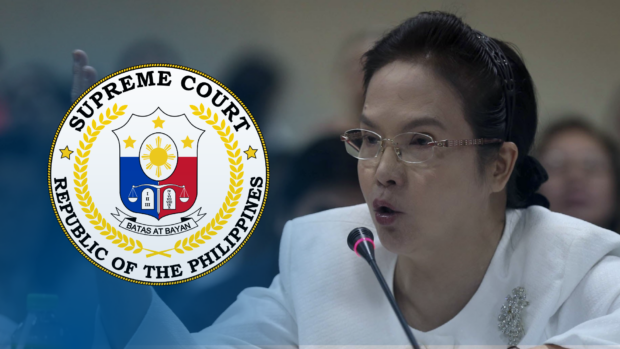SC denies PAO’s bid to remove ‘conflict of interest’ clause in lawyers’ new code

FILE PHOTO: Supreme Court and PAO chief Persida Acosta. INQUIRER FILES
MANILA, Philippines — The Supreme Court (SC) has rejected the Public Attorney’s Office (PAO) request to delete the conflict of interest clause in the new code of conduct for lawyers.
In a decision, the SC said the PAO’s request counters the principal duties of public lawyers.
Section 22, Canon III of the Code of Professional Responsibility and Accountability (CPRA) states: “Public Attorney’s Office; conflict of interest. – The Public Attorney’s Office is the primary legal aid service of the government. In the pursuit of its mandate under its charter, the Public Attorney’s Office shall ensure ready access to its services by the marginalized sectors of society in a manner that takes into consideration the avoidance of potential conflict of interest situations which will leave these marginalized parties unassisted by counsel.”
READ: PAO seeks indefinite suspension of ‘conflict of interest’ provision in new lawyer’s code
It also says that: “A conflict of interest of any of the lawyers of the Public Attorney’s Office incident to services rendered for the Office shall be imputed only to the said lawyer and the lawyer’s direct supervisor. Such conflict of interest shall not disqualify the rest of the lawyers from the Public Attorney’s Office from representing the affected client upon full disclosure to the latter and written informed consent.”
For PAO chief Persida Rueda-Acosta, the clause would result in a conflict of interest because public defenders would represent both parties of a case.
But the SC reminded the PAO of its primordial mandate, extending free legal assistance to indigent people in criminal, civil, labor, administrative, and other quasi-judicial cases.
READ: Citing new lawyers’ code, PAO tells SC: We can’t play both sides
“To turn away indigent litigants and bar them from availing of the services of all PAO lawyers nationwide due to alleged conflict of interest would be to contravene PAO’s principal duty and leave hundreds of poor litigants unassisted by legal counsel they cannot otherwise afford,” it said in a briefer, quoting the SC ruling. The briefer provided by the SC’s Public Information Office was released Wednesday and did not mention the date of the SC decision.
The SC, at the same time, ordered Acosta to explain why she should not be cited in indirect contempt for issuing “unfounded grievances” against the high court “as a threat to the independence of the judiciary.”
READ: PAO wants part in lawyers’ code changed to avoid conflict of interest
“The Court characterized Atty. Acosta resorted to social and print media to air her unfounded grievances against the Court as a threat to the independence of the judiciary. The Court thus ordered Atty. Acosta to show cause why she should not be disciplined as a Member of the Bar,” it said.
Sought for comment, Acosta said: “We will be waiting for the official copy of the Supreme Court resolution first.”